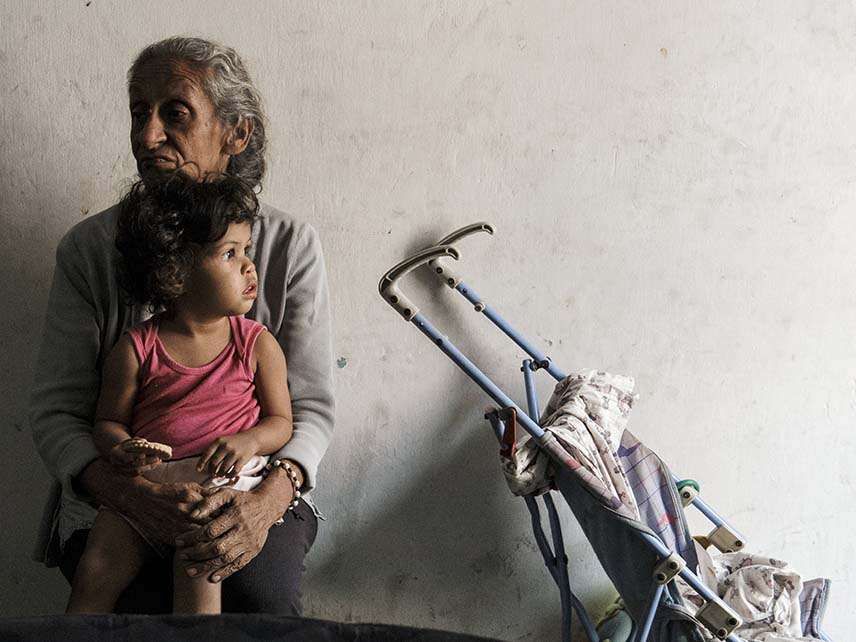Venezuela Relaxes Rules for Expats Sending Desperately Needed Money Home to Their Families
The country has liberalized one aspect of the disastrous capital controls established by Hugo Chavez in 2003.

In 2003, Venezuelan President Hugo Chávez pegged the exchange rate of the bolivar to the U.S. dollar at Bs.1,600/$1, which was one of the most disastrous policies of his 14-year tenure. Over the ensuing decade and a half, the government engaged in out-of-control money creation, with the annual inflation rate now running at over 6,000 percent. The 100 bolivar note has become more valuable shredded up and sold as confetti than as a medium of exchange.
Imports of food and medicine have dried up, and many firms only survive because the government allows them to exchange bolivars and dollars at a special discount. Officials have "weaponized" this discretionary power, cutting off companies accused of "waging economic war against the country." Trading money at the official exchange rate, which has risen to Bs.F.80,000/$1*, means depleting its value by a factor of 36, using the black market rate of about Bs.F.2.9 million/$1 as a reference.
Desperate for foreign currency, the government has moved in recent weeks to liberalize one aspect of this policy: the system by which Venezuelans living abroad send money home to their friends and relatives. Vice President Tareck El Aissami announced the move last month as an effort to thwart "organized crime mafias that foster and promote the criminal dollar." He granted three agencies with a combined 124 locations—Italcambio, Zoom Casa de Cambio, and Insular—permission to begin processing remittances through the Western Union and MoneyGram networks.
It's not clear if the government gave the three agencies complete discretion to set their own prices, but on June 12, Zoom Casa de Cambio boosted its exchange rate offering to Bs.F.1.3 million/$1. Within the last few days, it hiked the rate to Bs.F.2.2 million/$1.
Jean Paul Leidenz, a senior economist at the Caracas-based consultancy firm Ecoanalitica, says it's possible the remittance agencies are eyeing the black market rate published by DolarToday, the news site founded by Gustavo Díaz, a Venezuelan-born dissident who also works as a salesman at a Home Depot in Hoover, Alabama. DolarToday listed the exchange rate at 2.2 million bolivars on June 12, but as of today the price has risen to 2.9 million.
Today, most black market trades happen between Venezuelans who hold U.S. bank accounts and execute parallel transfers in the two countries, so the dollars exchanged never enter the country. Liberalizing remittance transfers brings dollars into Venezuela to finance imports, and opens a channel to individuals who aren't lucky enough to hold a foreign bank account.
The three remittance agencies sanctioned by the government are required to sell the dollars they collect for bolivars through the government-run auction program known as the "Sistema de Divisas de Tipo de Cambio Complementario Flotante de Mercado," or DICOM, according to Leidenz.
"It's a positive step, but it's completely insufficient," he says. "The government still only recognizes the Bs.F.80,000/$1 rate for any other use…so the distortions are going to keep happening."
Bitcoin provides another mechanism for circumventing the official exchange rate when moving money into Venezuela. In Reason's January 2017 issue, I profiled a 32-year-old expat living in Brazil, who routinely enlisted a friend to bring cash across the Colombian border to deposit in her parent's bank account, which was both risky and slow. After discovering bitcoin, she was able her to transfer money to her parents fast and hassle free.
*This post has been updated to distinguish between the bolivar (Bs.) and the "bolivar fuerte" (Bs.F.), a new currency introduced in 2008 at the valuation of Bs.1 = Bs.F.1,000.
